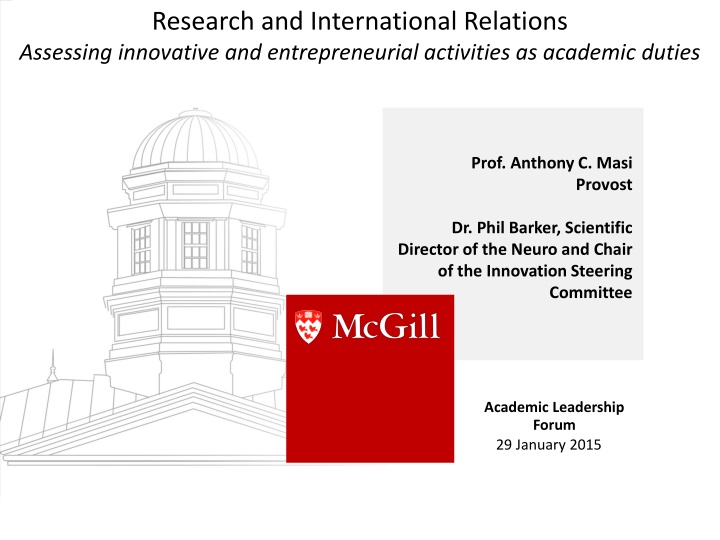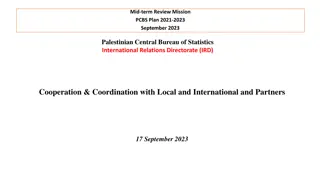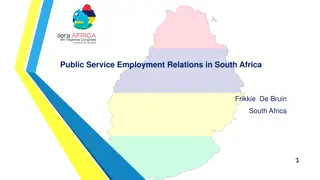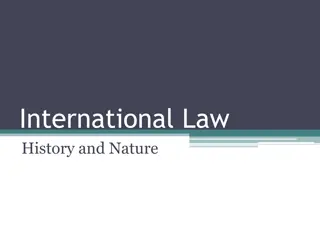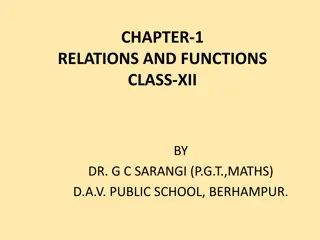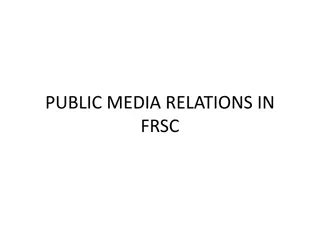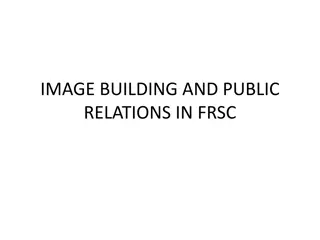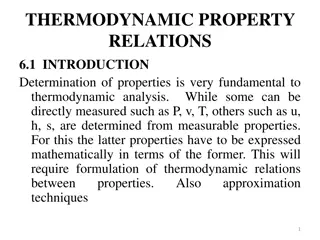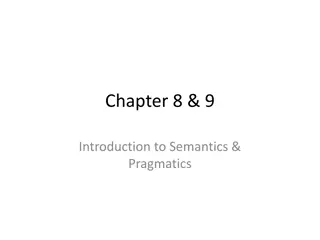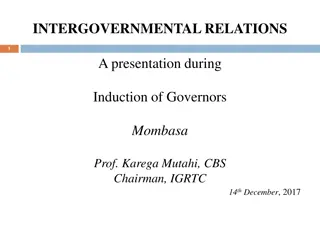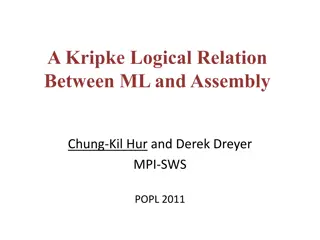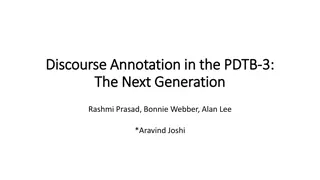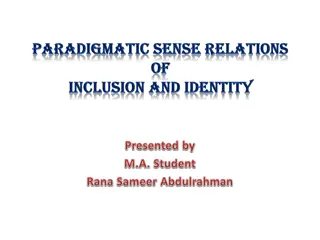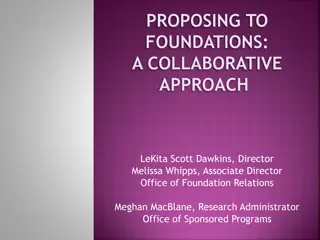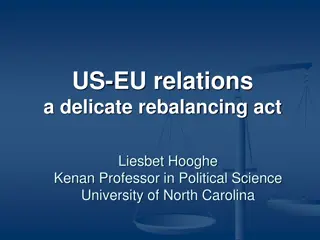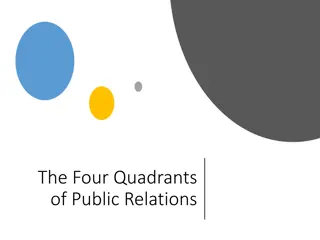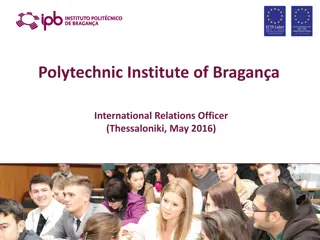Research and International Relations
McGill University's Academic Leadership Forum in 2015 focused on evaluating innovative and entrepreneurial endeavors as academic responsibilities. Discussions included recognizing and rewarding such activities, interacting with external partners, and supporting innovation within the academic mission. Examples were shared, showcasing the benefits of commercialization and industry collaboration. The forum highlighted the increasing emphasis on innovation and entrepreneurship at McGill.
Download Presentation

Please find below an Image/Link to download the presentation.
The content on the website is provided AS IS for your information and personal use only. It may not be sold, licensed, or shared on other websites without obtaining consent from the author.If you encounter any issues during the download, it is possible that the publisher has removed the file from their server.
You are allowed to download the files provided on this website for personal or commercial use, subject to the condition that they are used lawfully. All files are the property of their respective owners.
The content on the website is provided AS IS for your information and personal use only. It may not be sold, licensed, or shared on other websites without obtaining consent from the author.
E N D
Presentation Transcript
Research and International Relations Assessing innovative and entrepreneurial activities as academic duties Prof. Anthony C. Masi Provost Dr. Phil Barker, Scientific Director of the Neuro and Chair of the Innovation Steering Committee Academic Leadership Forum 29 January 2015
Provosts Welcome Welcome to the first Academic Leadership Forum of 2015, on the theme of assessing innovative and entrepreneurial activity as academic duties . A topic proposed by Dr. Rose Goldstein, Vice- Principal (Research and International Relations) Today s session will be chaired by myself and Dr. Phil Barker on her behalf. 2
Agenda 8:30AM -8:35AM Provost s Welcome(Prof. Anthony C. Masi, Provost) 8:35A-8:40AM Introduction(Dr. Phil Barker, Scientific Director, Montreal Neurological Institute, Chair, Innovation Steering Committee) 8:40AM-9:00AM Innovation, entrepreneurship and the academic mission 9:00AM-9:55AM Recognizing and rewarding innovative activity (open discussion) Is recognition given for innovative/entrepreneurial activity in our current regulations? Should it be? What types of innovative/entrepreneurial activities should be rewarded in academia? How can interactions with industry, NGO s, and players in the external marketplace enhance academic research? 9:55AM-10:00AM Closing remarks (Prof. Anthony C. Masi, Provost) 3
Innovation, entrepreneurship and the academic mission McGill is placing an increasing emphasis on enabling innovation/entrepreneurship: Examples: RIR re-organization to emphasize commercialization MUBEC Quartier de l innovation McGill Innovation Steering Committee Examining how we recognize and support innovation and entrepreneurship within our academic mission 4
Innovation, entrepreneurship and the academic mission Some personal examples: 1996 Co-founded Exogen Neuroscience >> Aegera Therapeutics >> sold in 2011 Licensed many antibodies, some transgenic mice to industry Several patents on novel methods/technologies Consultant to Millipore and Pfizer Net gains: Access to technology, reagents, networks, and research funding that have provided significant benefits to my academic basic research program. 5
Innovation, entrepreneurship and the academic mission Administrative Example: MNI Centre for Excellence In Commercialization and Research $15M over 5 years Milestone-driven annual reports, renewed upon successful completion of stated goals Results: Large amount of basic research (operating, student and PDF funding), several inventions licensed, new partnerships established, several companies formed 6
Recommendations from the Innovation Steering Committee: Stimulating entrepreneurial activity Entrepreneurship training: Minor in Entrepreneurship Enhance capacity for successful industrial partnerships: Promote opportunities for industrial cooperation Better and more transparent reporting Inventory and provide access to research platforms Amendments to IP policy: Better articulation of the philosophy, vision and intent behind the Policy Clarify who is an inventor at McGill Develop a guide for faculty inventors and a guide for student entrepreneurs 7
Recommendations from the Innovation Steering Committee: The academic career Tenure: Develop guidelines for research and service portions of the tenure dossier which allow for the inclusion of innovative/entrepreneurial activities. Merit: Encourage academic leaders to consider innovative/entrepreneurial activity when assessing merit. Sabbaticleaves: Allow sabbatic leaves to be used by faculty members to pursue entrepreneurial projects. Teaching releases: Where feasible within the Faculties, allow teaching releases for the pursuit of innovative/ entrepreneurial projects. 8
Survey Outcomes Perspectives on entrepreneurial/innovative activity in the academy: Agree Innovation and entrepreneurship support the academic mission of the University. Disagree Don t know No answer 0 5 10 15 20 25 The academic leadership (Deans, Associate Deans, Chairs, Directors) has a role to play in supporting innovative/entrepreneurial activities on the part of faculty members. Agree Disagree Don t know No answer 0 5 10 15 20 25 9
Survey Outcomes Institutional support for entrepreneurial/innovative activities: My unit has the support and/or resources needed to encourage faculty to engage in innovative and entrepreneurial activities. Agree Disagree Don t know No answer 0 5 10 15 20 25 10
Survey Outcomes Treatment of entrepreneurial/innovative activities in McGill regulations: Agree The concept of research as it relates to tenure and promotion encompasses innovative and entrepreneurial activities. Disagree Don t know No answer 0 5 10 15 20 25 Agree The concept of service as it relates to tenure and promotion encompasses innovation and entrepreneurship activities. Disagree Don t know No answer 0 5 10 15 20 25 11
Survey Outcomes Treatment of entrepreneurial/innovative activities in McGill regulations: Faculty members should be able to use sabbatical leaves to pursue entrepreneurial opportunities. Agree Disagree Don t know No answer 0 5 10 15 20 25 12
Open Discussion Is recognition given for innovative/entrepreneurial activity in our current regulations? Should it be? Prof. Lydia White, Associate Provost, Policies, Procedures & Equity 13
Open Discussion Regulations Relating to the Employment of Tenure Track and Tenured Academic Staff: 4.1 Academic Duties include: (i) teaching (such as graduate and undergraduate courses, supervision of individual students and assessment of student work); (ii) research and other original scholarly activities, and professional activities; and (iii) other contributions to the University and scholarly communities. Prof. Lydia White, Associate Provost, Policies, Procedures & Equity 14
Open Discussion Promotion Criteria: 8.5 A recommendation for promotion to Professor shall be based on the staff member s performance of Academic Duties, as outlined in Section 4.1. 8.5.1 Candidates for promotion must demonstrate: (i) a record of excellence in the area of research and/or other original scholarly activities, and professional activities, as evidenced by international recognition by peers; (ii) a record of high quality teaching; (iii) a substantial record of other contributions to the University and scholarly communities. Prof. Lydia White, Associate Provost, Policies, Procedures & Equity 15
Open Discussion Regulations on Sabbatic Leaves for Tenure Track and Tenured Academic Staff: 1.1 Sabbatic leave is [ ] intended to enrich the intellectual life of the University. Through sabbatic leaves, the University provides eligible members of the academic staff with an opportunity to enhance their knowledge and ability to contribute to the future research and teaching activities of the University by devoting time to scholarly inquiry and writing, and/or the improvement of professional skills. Sabbatic leave may also be used by staff members to: i. obtain a fresh perspective on an old problem; ii. begin a new and promising line of research and scholarly activity; iii. enhance their knowledge of their subject, discipline, profession or professional practice in order to improve the performance of their academic duties. 16
Open Discussion What types of innovative/entrepreneurial activities should be rewarded in academia? Prof. Paul Yachnin, Tomlinson Professor of Shakespeare Studies, English Department, Faculty of Arts, and Director, Institute for the Public Life of Arts and Ideas (IPLAI) 17
Open Discussion How can interactions with industry, NGO s, and players in the external marketplace enhance academic research? Prof. Benoit Boulet, Associate Dean, Research and Innovation, Faculty of Engineering 18
Closing Remarks Summation of key discussion points and recommended actions. Prof. Anthony C. Masi, Provost 19
Thank you We appreciate your participation. Please send any additional comments/feedback on this theme to: lea.cameron@mcgill.ca 20
The next ALF is 24 February: University Services Renovations and Small Projects End Caption
